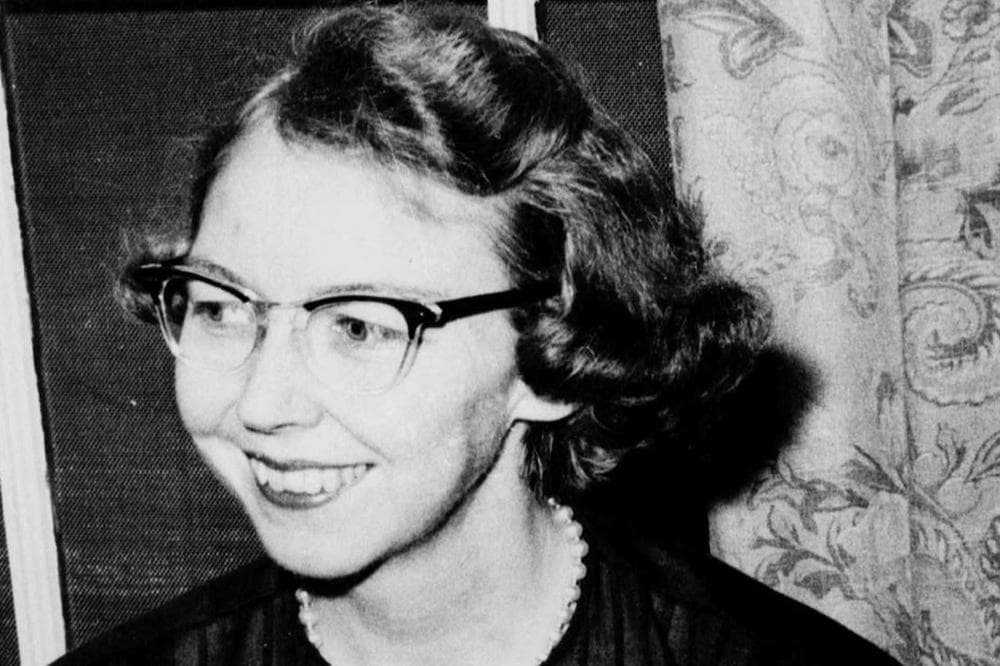Advertisement
Flannery O'Connor's Portrait In 'Prayer'
ResumeThe great Flannery O’Connor. A newly discovered journal of prayers gives a rare glimpse of the deeply Catholic writer and artist as a young woman.

American great Flannery O’Connor wrote dark, hard novels and stories that at their most Gothic, even cynical, remained somehow backlit by her Catholic faith. In “Wise Blood” and “A Good Man is Hard to Find” and more, there is dark humor, sarcasm, violence. A dryness toward the very idea of God. But there was a moment when a young Flannery O’Connor first left the South that she turned to God in astonishing prayer. Kept a journal of conversations with the divine. Beseeched the almighty to let her be a great writer. Up next On Point: When Flannery O’Connor talked to God.
-- Tom Ashbrook
Guests
W.A. Sessions, professor of English emeritus at Georgia State University, editor of Flannery O'Connor's "A Prayer Journal." Author of "Henry Howard, the Poet Early of Surrey," "Francis Bacon," and "A Shattering Of Glass."
Paul Elie, senior fellow at the Berkley Center for Religion, Peace and World Affairs at Georgetown University. Author of "The LIfe You Save May Be Your Own: An American Pilgrimage" and "Reinventing Bach."
Carlene Bauer, author of "Frances and Bernard" and "Not That Kind of Girl."
From Tom's Reading List
Virginia Quarterly Review: God's Grandeur: The Prayer Journal of Flannery O'Connor — "We know what O’Connor wanted for her fiction, but it is less clear what she wanted for her soul, because she does not confess to it other than obliquely. In the letters, when she advises Hester on prayer, she does admit to some extravagant petitioning. 'It’s only trying to see straight and it’s the least you can set yourself to do, the least you can ask for,' she writes. 'You ask God to let you see straight and write straight. I read somewhere that the more you asked God, the more impossible what you asked, the greater glory you were giving Him. This is something I don’t fail to practice, although not with the right motives.' But she does not tell Hester what impossible things she demands."
Slate: The Prayers of Flannery O’Connor -- " I’m jealous of Flannery O’Connor, though she’s been dead nearly 50 years. I envy her not only because she was brilliant, the maker of astoundingly original and subversive works of art, but because she believed in God. She believed in the Father, the Son, and the Holy Ghost. She believed in the Redemption, and Life Everlasting. She believed, with an unerring rigor, in the supernatural, and that God’s grace could open up upon us at our most dire moments and, if we accepted its gift, make us—fleetingly at least—better beings."
The Atlantic: The Passion of Flannery O’Connor — "Iowa was where spiky, brainy Mary Flannery O’Connor from Milledgeville, Georgia, became Flannery O’Connor, writer. Arriving in 1945 as a postgraduate student at the University of Iowa, she promptly homed in on the creative-writing classes run by the poet Paul Engle. Women were a minority at the time: by 1946, more than half of Engle’s pupils were returning servicemen, many of them writing stories about their experiences during the war. On the surface, as O’Connor’s biographer, Brad Gooch, tells it in Flannery, she was a quiet but significant classroom presence: “'She scared the boys to death with her irony,' remembered one visiting lecturer, Andrew Lytle."
Read An Excerpt From "A Prayer Journal" By Flannery O'Connor
This program aired on November 12, 2013.